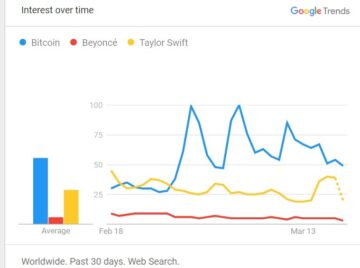
Stuart Kirk, a columnist for the Financial Times, has made a striking argument in favor of investing in a potential spot Bitcoin exchange-traded fund (ETF).
Kirk reveals his personal consideration to invest in a spot Bitcoin ETF, should it become available. His decision, inspired during a run along the Exmoor coast, reflects a willingness to embrace higher investment risks. He acknowledges the skepticism surrounding Bitcoin but argues for its potential as an investment vehicle.
Highlighting the growing public interest in spot Bitcoin ETFs and the cryptocurrency’s positive start to 2024, Kirk points to the anticipation surrounding the SEC’s decision on multiple spot Bitcoin ETF applications. He cites Bloomberg’s prediction of a 90% chance of SEC approval by January 10, aligning with his friend’s optimistic forecast of Bitcoin’s price potential.
Kirk addresses the SEC’s concerns about investor protection and market integrity, particularly regarding safe custody and market manipulation. He notes that while Bitcoin transactions are pseudonymous and potentially susceptible to manipulation, these issues are not vastly different from challenges faced by other regulated assets.
Kirk draws parallels between Bitcoin and traditional assets, discussing ownership concentration, intrinsic value, income generation, and asset valuation. He compares Bitcoin’s ownership concentration to significant stakes held in companies like LVMH, Facebook, and Tesla. Kirk also challenges the notion that Bitcoin’s lack of intrinsic value and income generation makes it unsuitable for serious portfolios, arguing that many assets, including stocks in the S&P 500, share similar characteristics.
Emphasizing Bitcoin’s low correlation with major asset classes and its high volatility, Kirk views Bitcoin as a unique addition to his portfolio. He acknowledges the risks but points to the attractive risk-adjusted returns.
Anthony Pompliano, co-founder of Pomp Investments, appeared on CNBC’s “Squawk Box” on January 5, 2024, to discuss the potential impact of the U.S. SEC’s decision on spot Bitcoin ETFs on the cryptocurrency market.
Pompliano referred to the anticipation surrounding the approval of U.S.-sanctioned spot Bitcoin ETFs as a major event, noting Bitcoin’s impressive performance as an asset over the past 15 years. He observed that Wall Street’s limited participation in this market has generated considerable excitement.
<!–
–> <!–
–>
Highlighting Bitcoin’s unique nature, Pompliano cautioned against treating it like typical assets, pointing to its high volatility. He referenced a Reflexivity Research report showing Bitcoin’s 800% surge from its pre-pandemic level to its peak, along with notable declines.
While acknowledging Bitcoin’s appealing risk-return profile, Pompliano stressed the importance of understanding its volatility. He mentioned that since 2017, Bitcoin has seen two 80% reductions in value and several 30% drops, advising investors to proceed with caution.
Pompliano expressed confidence in Bitcoin’s long-term price growth, attributing it to sustained demand from spot ETFs. He also noted that various publicly traded funds and ETFs are considering allocating a significant portion of their assets under management to spot Bitcoin ETFs.
Discussing Bitcoin’s intrinsic value, Pompliano argued that it is underpinned by the world’s most robust computing network, making it a compelling asset for those who prioritize computing power over traditional commodities.
He clarified that while owning a Bitcoin ETF offers exposure to Bitcoin, it does not equate to direct ownership. For those seeking direct ownership, Pompliano recommended self-custody of Bitcoin, rather than relying on ETFs or exchanges.
In response to rumors about the SEC possibly rejecting the Bitcoin ETF proposal, Pompliano suggested that either outcome would initially cause market volatility, but stability would return in the long run. He cited Bitcoin’s resilience, referencing its recovery following China’s mining ban.
Pompliano admitted to previously overestimating Bitcoin’s price but maintained that its volatility might decrease with the entry of more stable investors and the influence of ETFs. He also pointed to the upcoming Bitcoin halving and a potential return to loose monetary policy as key factors that could significantly influence Bitcoin’s price.
[embedded content]
Featured Image via Pixabay
- SEO Powered Content & PR Distribution. Get Amplified Today.
- PlatoData.Network Vertical Generative Ai. Empower Yourself. Access Here.
- PlatoAiStream. Web3 Intelligence. Knowledge Amplified. Access Here.
- PlatoESG. Carbon, CleanTech, Energy, Environment, Solar, Waste Management. Access Here.
- PlatoHealth. Biotech and Clinical Trials Intelligence. Access Here.
- Source: https://www.cryptoglobe.com/latest/2024/01/financial-times-stuart-kirk-expresses-confidence-in-investing-in-a-potential-sec-approved-spot-bitcoin-etf/
- :has
- :is
- :not
- ][p
- 10
- 15 years
- 15%
- 2017
- 2024
- 360
- 500
- a
- About
- addition
- admitted
- Ads
- advising
- against
- aligning
- All
- along
- also
- an
- and
- Anthony
- Anthony Pompliano
- anticipation
- appealing
- appeared
- applications
- approval
- ARE
- argued
- Argues
- argument
- AS
- asset
- asset valuation
- Assets
- attractive
- available
- Ban
- become
- between
- Bitcoin
- Bitcoin ETF
- Bitcoin halving
- bitcoin transactions
- but
- by
- Cause
- caution
- challenges
- Chance
- characteristics
- Chinas
- cited
- clarified
- classes
- Co-founder
- Coast
- Commodities
- Companies
- compelling
- computing
- computing power
- concentration
- Concerns
- confidence
- considerable
- consideration
- considering
- content
- Correlation
- could
- crazy
- cryptocurrency
- cryptocurrency market
- CryptoGlobe
- Custody
- decision
- Declines
- decrease
- Demand
- different
- direct
- discuss
- discussing
- does
- draws
- Drops
- during
- earth
- either
- embedded
- embrace
- entry
- ETF
- ETFs
- Event
- exchange-traded
- exchange-traded fund (ETF)
- Exchanges
- Excitement
- Explains
- Exposure
- expressed
- faced
- factors
- favor
- financial
- Financial Times
- following
- For
- Forecast
- from
- FT
- fund
- funds
- generated
- generation
- getting
- greatest
- Growing
- Growth
- Halving
- he
- Held
- High
- higher
- his
- HTTPS
- idea
- image
- Impact
- importance
- impressive
- in
- Including
- Income
- influence
- initially
- inspired
- integrity
- interest
- intrinsic
- Invest
- investing
- investment
- Investment vehicle
- Investments
- investor
- investor protection
- Investors
- invited
- isn
- issues
- IT
- ITS
- January
- jpg
- Key
- kirk
- Lack
- Level
- like
- Limited
- Long
- long-term
- Low
- lvmh
- made
- maintained
- major
- MAKES
- Making
- management
- Manipulation
- many
- Market
- market manipulation
- market volatility
- mentioned
- might
- Mining
- mining ban
- Monetary
- Monetary Policy
- more
- most
- multiple
- Nature
- network
- notable
- noted
- Notes
- noting
- Notion
- observed
- of
- Offers
- on
- Optimistic
- or
- Other
- Outcome
- over
- ownership
- owning
- Parallels
- participation
- particularly
- past
- Peak
- performance
- personal
- plato
- Plato Data Intelligence
- PlatoData
- points
- policy
- Pomp
- pompliano
- portfolio
- portfolios
- portion
- positive
- possibly
- potential
- potentially
- power
- prediction
- previously
- price
- Prioritize
- proceed
- Profile
- proposal
- protection
- public
- publicly
- rather
- recommended
- recovery
- reductions
- referencing
- referred
- reflects
- REFLEXIVITY RESEARCH
- regarding
- regulated
- relying
- report
- research
- resilience
- response
- return
- returns
- Reveals
- risk-adjusted
- risks
- robust
- Rumors
- Run
- s
- S&P
- S&P 500
- safe
- Screen
- screens
- SEC
- seeking
- seen
- Self Custody
- serious
- several
- Share
- should
- show
- showing
- significant
- significantly
- similar
- since
- sizes
- Skepticism
- Spot
- Spot Bitcoin Etf
- Stability
- stable
- stakes
- start
- Stocks
- street
- surge
- Surrounding
- susceptible
- sustained
- T
- Tesla
- than
- that
- The
- The Financial Times
- their
- These
- this
- those
- times
- to
- traded
- traditional
- Transactions
- treating
- two
- typical
- u.s.
- under
- underpinned
- understanding
- unique
- upcoming
- use
- Valuation
- value
- various
- vehicle
- via
- views
- Volatility
- Wall
- Wall Street
- while
- WHO
- why
- Willingness
- with
- world’s
- would
- years
- youtube
- zephyrnet











